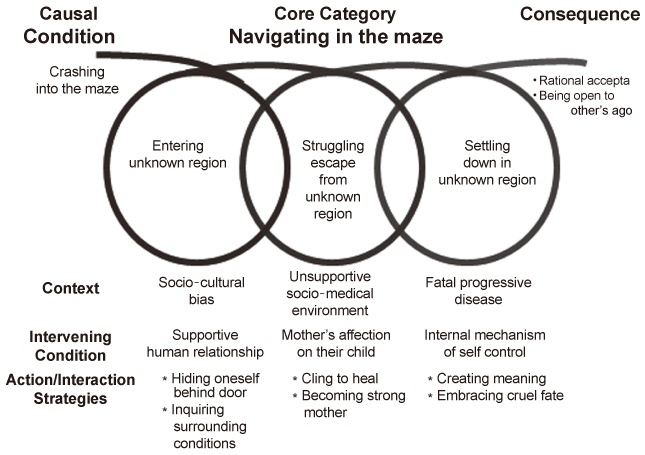J Korean Acad Nurs.
2012 Oct;42(5):609-621. 10.4040/jkan.2012.42.5.609.
Life Experiences of Mothers in Parenting Children with Hunter's Syndrome
- Affiliations
-
- 1Department of Nursing, Kkotongnae University, Chungbuk, Korea. srkang@kkot.ac.kr
- KMID: 1499489
- DOI: http://doi.org/10.4040/jkan.2012.42.5.609
Abstract
- PURPOSE
The purpose of this study was to explore the experiences of Korean mothers in parenting children with Hunter's syndrome, an X linked recessive genetically inherited disease usually affecting boys.
METHODS
Data were collected from 14 mothers having children with Hunter's syndrome, through two focus group interviews and individual in-depth interviews. Qualitative data from the field notes and transcribed notes were analyzed using the grounded theory methodology developed by Strauss & Corbin (1998).
RESULTS
The core category about the process of rearing children with Hunter's syndrome was identified as "navigating in the maze". The process of rearing children with Hunter's syndrome passed through three phases; 'entering an unknown region', 'struggling to escape from the unknown region', 'settling down in the unknown region'.
CONCLUSION
In this study "navigating in the maze", as the core category deeply showed joys and sorrows of mothers in the process of rearing their children with Hunter's syndrome. In this rearing process they gradually adjusted themselves to their given condition. Also they gained initiatively coping strategies to care for, and protect their children. Therefore health care providers can establish supportive programs in the clinical field to empower these mothers by reflecting their proactive coping strategies.
Keyword
MeSH Terms
Figure
Cited by 1 articles
-
Experiences of Parenting Children With Spinal Muscular Atrophy
Hyo Jin Kim, Sun-Mi Chae
J Korean Soc Matern Child Health. 2022;26(3):194-203. doi: 10.21896/jksmch.2022.26.3.194.
Reference
-
1. Fitzgerald R. Biological citizenship at the periphery: Parenting children with genetic disorders. New Genet Soc. 2008. 27(3):251–266. http://dx.doi.org/10.1080/14636770802326927.2. Goldman A. Home care of the dying child. J Palliat Care. 1996. 12(3):16–19.3. Johansson A, Anderzen-Carlsson A, Ahlim A, Andershed B. Mothers' everyday experiences of having an adult child who suffersfrom long-term mental illness. Issues Ment Health Nurs. 2010. 31(11):692–699. http://dx.doi.org/10.3109/01612840.2010.515768.4. Lee CH. Green cross, Hunter syndrome medicine coming years 500 billion in annual sales goals. Korea Joongang Daily. 2012. 01. 11. E5.5. Little C, Gould R, Hendriksz C. The management of children with Hunter syndrome-a case study. Br J Nurs. 2009. 18(5):321–322.6. Martin R, Beck M, Eng C, Giugliani R, Harmatz P, Muñoz V, et al. Recognition and diagnosis of mucopolysaccharidosis II (Hunter syndrome). Pediatrics. 2008. 121(2):e377–e386.7. Metcalfe A, Coad J, Plumridge GM, Gill P, Farndon P. Family communication between children and their parents about inherited genetic conditions: A meta-synthesis of the research. Eur J Hum Genet. 2008. 16:1193–1200. http://dx.doi.org/10.1038/ejhg.2008.84.8. Oh SE. The lived experience of mothers of children with muscular dystrophy. Korean J Child Health Nurs. 2001. 7(4):421–433.9. Oh SE. Caring experience of parents of children with muscular dystrophy. Korean J Fam Ther. 2005. 13(2):171–194.10. Park HS, Kim KB. Joys and sorrows in mothers of children with mucopolysaccharidosis. J Korean Acad Child Health Nurs. 2011. 17(1):58–67. http://dx.doi.org/10.4094/jkachn.2011.17.1.58.11. Rose N. The politics of life itself: Biomedicine, power and subjectivity in the twenty-first century. 2007. New Jersey: Princeton University Press.12. Rozdzynska A, Tylki-Szymanska A, Jurecka A, Cieslik J. Growth pattern and growth prediction of body height in children with muccopolysaccharidosis type II. Acta Paediatr. 2011. 100(3):456–460. http://dx.doi.org/10.1111/j.1651-2227.2010.02060.x.13. Sandelowski M. The problem of rigor in qualitative research. ANS Adv Nurs Sci. 1986. 8(3):27–37.14. Steele RG. Experiences of families in which a child has a prolonged terminal illness: Modifying factors. Int J Palliat Nurs. 2002. 8(9):418–434.15. Strauss A, Corbin J. Basic of qualitative research: Techniques and procedures for developing grounded theory. 1998. CA, Thousand Oaks: Sage.16. Yi M, Choe MA, Hah YS, Kim KS, Yih BS, Kim JH. Mother's experience of caregiving for their children with schizophrenia. J Korean Acad Nurs. 2006. 36(1):45–54.
- Full Text Links
- Actions
-
Cited
- CITED
-
- Close
- Share
- Similar articles
-
- Parenting experiences of mothers of moderate-to-late preterm children in South Korea: a qualitative study
- Parenting Stress and Efficacy of the Mothers of Children with Internet Addiction and Attention-Deficit Hyperactivity Disorder
- A Phenomenological Study on the Experiences of Parenting Burden of Working Mother with Young Children in Korea
- Factors Affecting the Life Quality in Mothers of Children with Disabilities
- The Parenting Experiences of Mothers of Children with Brain Lesions and are at Risk of Aspiration


